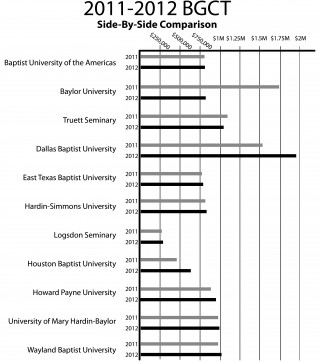By Daniel C. Houston
Staff Writer
The executive board of the Baptist General Convention of Texas (BGCT) is considering a budget proposal that would cut Baylor’s non-seminary share of cooperative program funding by more than half.
Baylor’s cut in funding – from $1.72 million in 2011 to $831,175 in 2012 – would come amid net increases in funding for every other participating Texas Baptist university, according to a copy of the proposal provided by John Hall, news director for the BGCT. Funding for the George W. Truett Theological Seminary would remain relatively stable at $1.1 million – a 1.7-percent cut.
Steve Vernon, acting executive director for the BGCT, said the decision was influenced by a decrease in revenue across the state, but also by considerations for a more equal distribution of funding among the various institutions. Combined with funding for Truett, Baylor’s portion amounted to 27 percent of the 2011 total, split between it and 10 other institutions.
“We have been evaluating how we fund all of our institutions, so this is a proposal that has grown out of that,” Vernon said. “It’s really grown out of trying to answer that question: ‘How do we treat everyone the same way?’”
To this point, Baylor has held off on responding in detail to the prospect of losing BGCT funding, citing the lengthy process the proposal would have to go through before a final budget could be adopted during the BGCT’s annual meeting on Oct. 24-26.
“Our understanding is that this is part of the BGCT budgeting process that is ongoing, and since it’s still working through this process, it’s premature for us to comment,” Lori Fogleman, director of Baylor media relations, said.
Vernon said the proposed budget would cut off all “pro rata” funding for universities relating to the BGCT by special agreement, rather than direct affiliation. Pro-rata funding refers to funds whose amount varies according to the number of semester hours taught at each institution. In order to be considered an affiliated institution, a Texas Baptist university must allow the BGCT to select at least 75 percent of the members on its board of trustees; Baylor allows the BGCT to select 25 percent of its regent membership. Houston Baptist University is the only other non-affiliated university, although a large proposed increase in its base funding level from the BGCT would more than offset HBU’s loss of pro-rata funding.
While Vernon said he wasn’t aware of other university presidents claiming Baylor was given an unfair priority in previous funding levels, he said the numbers do seem to indicate a certain level of inequality in Baylor’s favor that the new proposal is intended to remedy.
“I think it’s a reflection of the influence in governance that we have with all of our institutions,” Vernon said, “and is in the interest of treating all of our institutions, as they relate to us, equally.”
The budget proposal has been reviewed by the BGCT executive board’s finance and education subcommittees, but still needs to be reviewed by the institutional relations committee. Vernon said the executive board will vote on whether to recommend the budget on Sept. 26 or 27 to the BGCT messengers at their annual meeting.
The Baylor Board of Regents’ decision earlier this year to allow non-Baptist Christians to hold positions on the board prompted the BGCT executive board to request a renegotiation of the special agreement between the two organizations. Vernon said the proposal to lower funding for Baylor was not related to any tension resulting from this decision.
“From my perspective, this was something that was on the horizon before Baylor made that decision,” Vernon said. “The simple truth is that we still elect 25 percent of their regents and they elect 75 percent, and with the inclusion of non-Baptist regents, that didn’t change.”






